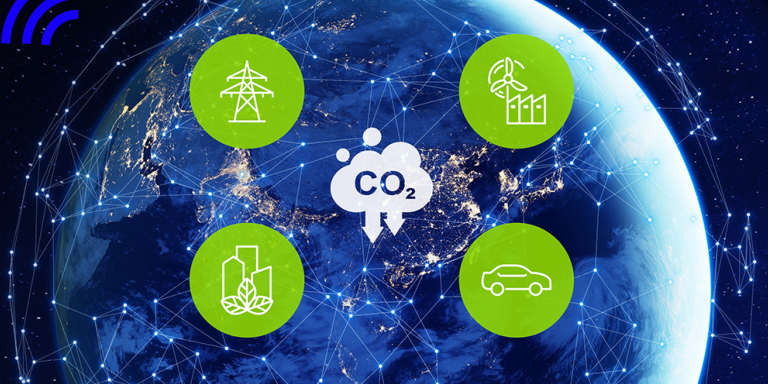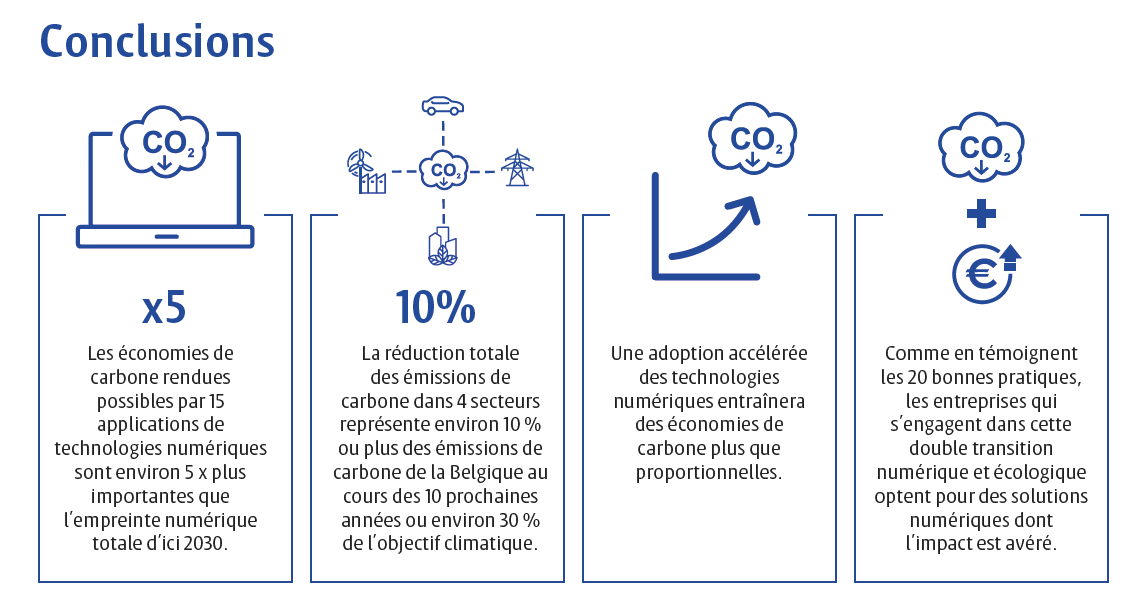
Digital4Climate, an Agoria study conducted by Accenture, looks at the carbon reduction potential of digital technologies in the four most carbon-intensive sectors in Belgium: industry, construction, mobility and logistics, and energy. One of the conclusions is that the positive impact of 15 digital applications in these sectors will be five times larger than the total digital footprint by 2030.
CO2 emissions in Belgium in 2019 were about 116.5 megatons, they could be reduced by 10.4 to 13.3 megatons in 2030 through the deployment of digital solutions in the 4 most CO2 intensive Belgian sectors, which is about 10% of Belgium’s total emissions today.
According to the European Fit for 55 proposal, introduced in July 2021, which raised the greenhouse gas emission reduction target of the “Green Deal for Europe” to 55% by 2030 compared to 1990 emissions, Belgium’s emissions should fall to 87 megatons of CO2 according to a first estimate. Digital technologies could account for about 30% of this target.
This reduction potential was calculated in relation to the total footprint of the digital sector, which represents about 2% of Belgian emissions. Currently estimated at 2.8 megatons of CO2, it could be between 2.2 and 2.6 megatons thanks to the improvement of the sector’s energy efficiency and the reduction of the CO2 intensity of the Belgian electricity grid. Telecoms and data center operators have committed to using only renewable energy by 2030, reducing the footprint of networks and data centers by an additional 48%.
The 4 sectors emitting the most CO2
Industry
Industry is responsible for 29% of Belgium’s CO2 missions (33.6 megatons), with the processing industry, with chemicals, metals and cement contributing the most. On the other hand, it is industry that has the greatest potential for CO2 reduction. Digital technologies such as AI, digital twin and industrial IoT could reduce CO2 emissions by 3.4 to 4.2 megatons, or some 10 to 12.3% of the sector’s total emissions.
Advanced data analytics and automation can significantly reduce energy intensity, and virtual product and process simulations such as digital twin can model reality with great accuracy, with benefits in terms of efficiency and CO2 emissions reduction.
The building industry
Construction is the sector of the building industry with the largest footprint, 8.3 to 10.8% of total building emissions could be reduced, mainly through Building Management System (BMS) for buildings and Building Information Modeling (BIM) in construction.
Energy
The energy sector can achieve a 12-14.5% carbon reduction through digital technologies that catalyze the transition to green energy.
Mobility and logistics
In this sector, digital technologies could lower total emissions by 10.6 and 14.2%. Increasing telecommuting, optimizing existing modes of transport with smart traffic management tools and reducing freight transport with, for example, autonomous ships on inland waterways are identified as key drivers of this reduction.
Digital4Climate: “yes, we can

Citizens, governments and businesses can play an important role in deploying digital technologies for climate. Companies that are committed to the digital and ecological transition are favored by customers and gain a competitive advantage. All of them can be inspired by the 15 concrete digital solutions of the study and its 20 practical examples of Belgian companies in the different sectors.
A Digital4Climate innovation program, in which Agoria is ready to cooperate, is essential to raise awareness among citizens and companies and to encourage them to adopt a “yes we can” attitude. The public authorities must set up such a program before the end of the current legislature in order to massively reduce CO2 emissions and thus reach the Belgian climate objective. On the other hand, it would also facilitate data collaboration and train more people in digital and green skills.
The study considered 2 scenarios depending on the adoption rate of the 15 proposed digital solutions and technologies by 2030. According to these, the reduction in CO2 emissions in these four sectors is 4.7 to 5.2 times the total digital footprint of Belgium. They demonstrated that the more digitalization, the more CO2 emissions can be reduced. Agoria is firmly convinced that digital technologies can contribute to the answer to the climate challenge. The digital transition and the green transition can reinforce each other, ensure sustainable growth and contribute to Belgium’s economic and social prosperity.
Translated from Belgique : l’étude Digital4climate conclut que 15 technologies auront un impact positif sur l’empreinte carbone du secteur numérique d’ici 2030









